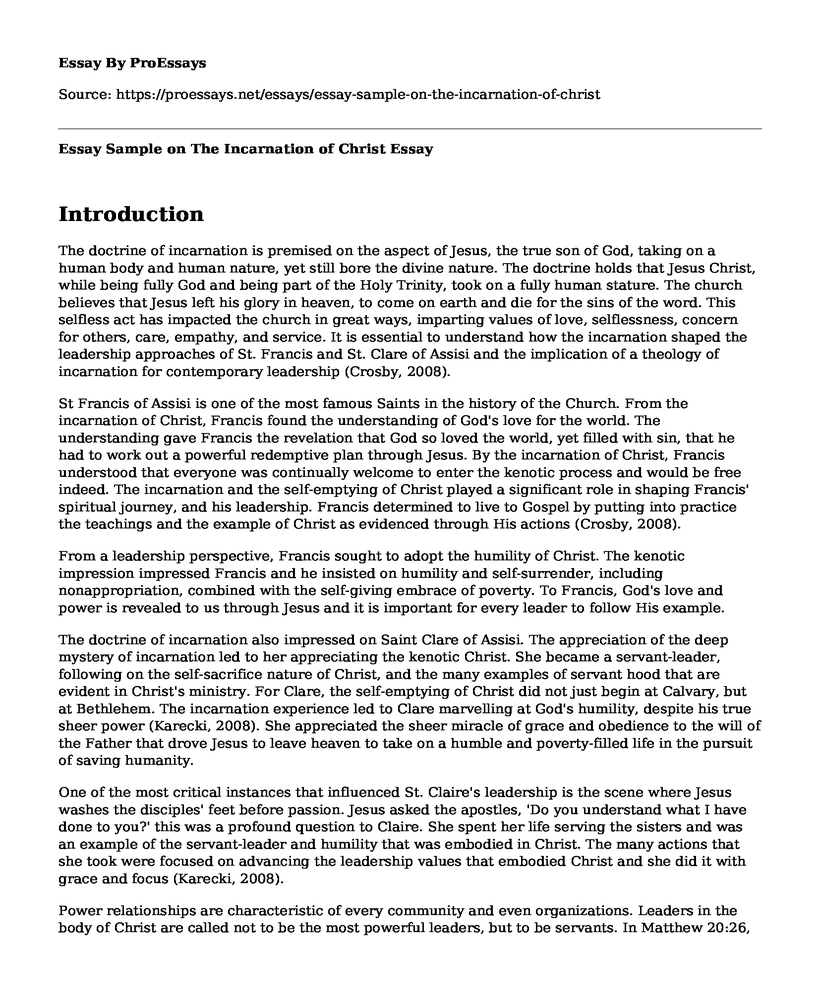Introduction
The doctrine of incarnation is premised on the aspect of Jesus, the true son of God, taking on a human body and human nature, yet still bore the divine nature. The doctrine holds that Jesus Christ, while being fully God and being part of the Holy Trinity, took on a fully human stature. The church believes that Jesus left his glory in heaven, to come on earth and die for the sins of the word. This selfless act has impacted the church in great ways, imparting values of love, selflessness, concern for others, care, empathy, and service. It is essential to understand how the incarnation shaped the leadership approaches of St. Francis and St. Clare of Assisi and the implication of a theology of incarnation for contemporary leadership (Crosby, 2008).
St Francis of Assisi is one of the most famous Saints in the history of the Church. From the incarnation of Christ, Francis found the understanding of God's love for the world. The understanding gave Francis the revelation that God so loved the world, yet filled with sin, that he had to work out a powerful redemptive plan through Jesus. By the incarnation of Christ, Francis understood that everyone was continually welcome to enter the kenotic process and would be free indeed. The incarnation and the self-emptying of Christ played a significant role in shaping Francis' spiritual journey, and his leadership. Francis determined to live to Gospel by putting into practice the teachings and the example of Christ as evidenced through His actions (Crosby, 2008).
From a leadership perspective, Francis sought to adopt the humility of Christ. The kenotic impression impressed Francis and he insisted on humility and self-surrender, including nonappropriation, combined with the self-giving embrace of poverty. To Francis, God's love and power is revealed to us through Jesus and it is important for every leader to follow His example.
The doctrine of incarnation also impressed on Saint Clare of Assisi. The appreciation of the deep mystery of incarnation led to her appreciating the kenotic Christ. She became a servant-leader, following on the self-sacrifice nature of Christ, and the many examples of servant hood that are evident in Christ's ministry. For Clare, the self-emptying of Christ did not just begin at Calvary, but at Bethlehem. The incarnation experience led to Clare marvelling at God's humility, despite his true sheer power (Karecki, 2008). She appreciated the sheer miracle of grace and obedience to the will of the Father that drove Jesus to leave heaven to take on a humble and poverty-filled life in the pursuit of saving humanity.
One of the most critical instances that influenced St. Claire's leadership is the scene where Jesus washes the disciples' feet before passion. Jesus asked the apostles, 'Do you understand what I have done to you?' this was a profound question to Claire. She spent her life serving the sisters and was an example of the servant-leader and humility that was embodied in Christ. The many actions that she took were focused on advancing the leadership values that embodied Christ and she did it with grace and focus (Karecki, 2008).
Power relationships are characteristic of every community and even organizations. Leaders in the body of Christ are called not to be the most powerful leaders, but to be servants. In Matthew 20:26, Christ admonished the apostles that he who wanted to be great among them must first learn how to serve. From the self-emptying of Christ, there are many leadership values that can be learnt and modern leaders need to focus on following the example of Christ. As evidenced from the lives and works of St. Francis and St. Clare of Assisi, the incarnation of Christ is the most powerful leadership example for the Church today.
References
Crosby, M. (2008). Finding Francis, Following Christ. Orbis Books. ISBN-10: 1570757291, ISBN-13: 978-1570757297.
Karecki, M. (2008). Clare of Assisi: Foot-washing leadership. Inner Resources for Leaders. School of Global Leadership & Entrepreneurship, Regent University, Virginia Beach, VA 2346. 1(1), 1-9.
Cite this page
Essay Sample on The Incarnation of Christ. (2022, Nov 17). Retrieved from https://proessays.net/essays/essay-sample-on-the-incarnation-of-christ
If you are the original author of this essay and no longer wish to have it published on the ProEssays website, please click below to request its removal:
- Relationship Between Islam and Protestant Reformation Essay
- Mayor Bloomberg Speech on Ground Zero Mosque at Governor's Island
- The Period of Islamic Spain and Renaissance Essay Example
- Essay Sample on Ontology & Epistemology in Philosophy
- Rizal's Retraction Essay Example
- Essay Example on God, Evil, and the Problem of Omnipotence
- Creation in Biblical Perspective Discussion Questions - Free Report







